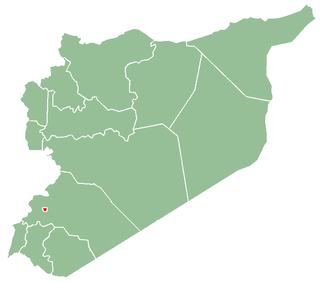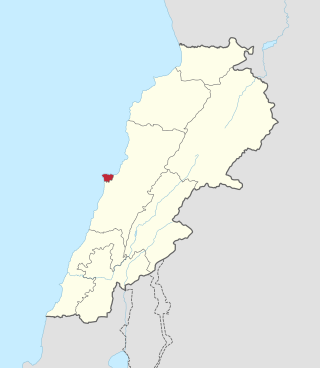Terrorism in Syria has a long history dating from the state-terrorism deployed by the Ba'athist government since its seizure of power through a violent coup in 1963. The Ba'athist government have since deployed various types of state terrorism; such as ethnic cleansing, forced deportations, massacres, summary executions, mass rapes and other forms of violence to maintain its totalitarian rule in Syria. The most extensive use of state terrorism in the 20th century was during 1970s and 1980s, when Islamic uprisings across Syria where crushed through bloody campaigns of intense repression, culminating in the 1982 Hama massacre which killed around 40,000 civilians.
Saraqib is a city in northwestern Syria, administratively belonging to the Idlib Governorate, located east of Idlib. During the course of the Syrian Civil War, the city fell into rebel forces in 2012 and was recaptured by the Syrian Army in 2020.

The 2008 Damascus car bombing was a car bombing that occurred on 27 September 2008 in the Syrian capital of Damascus. The explosion left 17 people dead and 14 injured. A car, laden with 200 kilograms of explosives detonated in the Sidi Kadad suburb of the capital, at approximately 8:45am. The blast occurred roughly 100 metres from a security installation on the road to Damascus International Airport at an intersection leading to the Sayyidah Zaynab Mosque, popular with Shia pilgrims from Iran and Lebanon. Security forces cordoned off the area.

The Abdullah Azzam Brigades, or al-Qaeda in Lebanon, is a Sunni Islamist militant group, and al-Qaeda's branch in Lebanon. The group, which began operating in 2009, was founded by Saudi Saleh Al-Qaraawi and has networks in various countries, mainly in Egypt, Iraq, Syria, Jordan, the Gaza Strip and Lebanon.
Major General Hisham Ikhtiyar ; 1941 – 20 July 2012) was a Syrian military official, and a national security adviser to president Bashar al-Assad.
The following is a timeline of the Syrian uprising from September to December 2011. This period saw the uprising take on many of the characteristics of a civil war, according to several outside observers, including the United Nations Commission on Human Rights, as armed elements became better organized and began carrying out successful attacks in retaliation for the ongoing crackdown by the Syrian government on demonstrators and defectors.
Riad Mousa al-Asaad is a Syrian military commander, politician who is the founding leader of the Free Syrian Army. One of the prominent faces of the Syrian Civil War, he led the armed resistance to the Assad regime as commander-in-chief of FSA, during the early phase of the Syrian Civil War. Under Riad al-Asaad's command, FSA expanded into a paramilitary force of 75,000 guerillas and insurgents in March 2012; capable of ousting regime forces from Damascus. He currently serves as the Deputy Prime Minister for Military Affairs of the Syrian Salvation Government, a position he has held since 2 November 2017. He was a former Colonel in the Syrian Air Force who defected to the opposition in July 2011 and became the first Acting Commander-in-chief of the Free Syrian Army.
The Rif Dimashq clashes were a series of unrests and armed clashes in and around Damascus, the capital of Syria, from November 2011 until a stalemate in March 2012. The violence was part of the wider early insurgency phase of the Syrian civil war. Large pro-government and anti-government protests took place in the suburbs and center of Damascus, with the situation escalating when members of the Free Syrian Army (FSA) started attacking military targets in November.
The following is a timeline of the Syrian Civil War from January to April 2012, during which time the spate of protests that began in January 2011 lasted into another calendar year. An Arab League monitoring mission ended in failure as Syrian troops and anti-government militants continued to do battle across the country and the Syrian government prevented foreign observers from touring active battlefields, including besieged opposition strongholds. A United Nations-backed ceasefire brokered by special envoy Kofi Annan met a similar fate, with unarmed UN peacekeepers' movements tightly controlled by the government and fighting.
On 6 January 2012, a bomb exploded in the Al-Midan district of Damascus, Syria. According to the Syrian government, a suicide bomber attacked buses carrying riot police shortly before an anti-government protest was to begin. It said that 26 people were killed and over 60 were injured. Most of the victims were civilians, though the Syrian government showed footage of what it claimed to be the funeral of 11 police officers killed in the attack.
On 10 February 2012, two large bombs exploded at Syrian security forces buildings in Aleppo. According to the Syrian government and state media, the blasts were caused by two suicide car bombs. It reported that 28 people were killed and 235 wounded. The bombings took place during the Syrian civil war and the government blamed armed opposition groups.
The 10 May 2012 Damascus bombings were carried out using a pair of car bombs allegedly detonated by suicide bombers outside a military intelligence complex in Damascus, Syria. Combined, the perpetrators detonated more than 1,000 kilograms (2,200 lb) of explosives, tearing the facade off a 10-story building. With 55 people confirmed dead and almost 400 others injured, the attack was the deadliest bombing to date in the Syrian Civil War, though later outpaced by other events.

The Battle of Damascus, also known as Operation Damascus Volcano, started on 15 July 2012 during the Syrian civil war. It is unclear who started the battle. Thousands of rebels infiltrated Damascus from the surrounding countryside. Following this, according to some reports, the opposition forces launched an operation to capture the capital, while according to other reports, the military learned of the large-scale rebel operation beforehand and made a preemptive strike. Some reports even suggested the rebels launched the operation prematurely due to their plans being discovered by the security forces.
The 18 July 2012 Damascus bombing of the National Security headquarters in Rawda Square, Damascus, killed and injured a number of top military and security officials of the Syrian government. Among the dead were the Syrian Defense Minister and Deputy Defense Minister. The incident occurred during the Syrian Civil War, and is considered to be one of the most notorious events to affect the conflict. Syrian state-controlled television reported that it was a suicide attack while the opposition claims it was a remotely detonated bomb.

The Damascus offensive (2013) refers to a series of rebel operations that began in early February 2013 in and around the city of Damascus.

The 2013 Reyhanlı car bombings took place on 11 May 2013, when two car bombs exploded in the Turkish town of Reyhanlı, a town of 64,000 people, 5 km from the Syrian border and the busiest land border post with Syria, in Hatay Province, Turkey. At least 52 people were killed and 140 injured in the attack.

The 2013 Iranian embassy bombing in Beirut was a double suicide bombing that occurred in front of the Iranian embassy in Beirut, Lebanon on 19 November 2013. The two bombings resulted in 23 deaths and injured at least 160 others.
The Fighting Vanguard of the Mujahidin or the Fighting Vanguard of the Muslim Brotherhood in Syria was a splinter group of the Muslim Brotherhood in Syria that took part in violent actions against the ruling Baath regime during the Islamist uprising in Syria mainly between 1976 and 1982.





